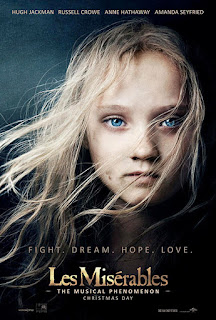 |
| Courtesy of Universal |
Tom
Hooper won a slew of Oscars for The King’s Speech in 2010, so the pressure on
his next project was always going to be huge. But then he decided to tackle the
big screen version of Les Miserables, one of the most beloved musicals of all
time, and the stakes were upped considerably. For every well-made movie musical
like Dreamgirls or Hairspray, there are a ton of clunkers like The Phantom
of the Opera or Rock of Ages.
Fortunately,
Hooper’s adaptation of the classic production is mostly a success. He takes a
lot of interesting risks and most of them work. However, he also makes some
flat-out bizarre directorial choices that left me scratching my head.
Hugh
Jackman leads a stellar cast as Jean Valjean, a convict who has spent most of
his life in prison for the crime of stealing a loaf of bread to feed his
starving family. Not much leniency in 19th-century France, I suppose. After
he’s paroled, Valjean decides to start a new life under a new identity, which provokes
the wrath of persistent policeman Javert (Russell Crowe).
Years
later, he becomes the mayor of a small town and a prominent businessman. After
a tragic misunderstanding, one of his factory employees, Fantine (Anne
Hathaway), is fired and left to fend for herself on the street. By the time
Valjean realizes what has transpired, the woman is beyond help.
However,
he vows to care for Fantine’s young daughter, Cosette (played by Isabelle Allen
as a child and by Amanda Seyfried as an adult), as if she were his own. The
decision has ramifications that stretch over several years and impact the lives
of many others, including a young freedom fighter (Eddie Redmayne); the girl (Samantha
Barks) in love with him; and a thieving husband and wife (Sacha Baron Cohen and
Helena Bonham Carter).
The
most intriguing choice Hooper makes is having all the performers sing live,
rather than lip synch to a prerecorded track like most movie musicals. Because
most (but definitely not all) of the actors are gifted vocalists, it’s a
decision that pays off beautifully. Instead of worrying about matching their
lips to the words, the performers can focus more on their emotions in the
moment.
Jackman
and Barks in particular use the method to wonderful effect. When Jackman sings “Who
Am I?” – about being torn between revealing his character’s true identity or remaining
in the shadows – you appreciate the pain of his dilemma. When Barks delivers
the first few notes of “On My Own,” singing about her unrequited love, the
goosebumps pop up almost immediately.
But those two examples are nothing compared to
Hathaway’s utterly astounding work as Fantine. In her brief time on screen, she
creates a fully-realized character that is believable, sympathetic and
absolutely heartbreaking. If you’re not wiping away tears by the end of “I
Dreamed a Dream,” then you’re made of stronger stuff than me. I don’t see how
anyone beats Hathaway for Best Supporting Actress.
Hooper
doesn’t do everything perfectly, though. I’m not sure why he cast Crowe, who
doesn’t so much sing as plant his feet and yell to the back wall. He’s perfect
for the part in theory, but the choice doesn’t pan out in practice. Cohen and
Carter are also miscast, their scenes feeling like they take place in a
completely different movie. One second the audience is watching Les
Miserables, then they’re suddenly in the middle of Tim Burton’s Sweeney Todd
or something.
The
overabundance of extreme close ups in the film bugged me as well. Any time someone
is singing, Hooper’s default move is to push the camera up the character’s
nose. A cinematic adaptation of a musical is supposed to expand the story’s
world beyond the stage. Many of Hooper’s choices do the opposite; they make the
film version feel small instead of epic.
Overall,
fans of Les Miserables have a lot to be thankful for. A big screen version of
the musical could’ve been an absolute disaster, but the material translated to
the screen fairly well. I definitely had some quibbles, but the power of the
story, the performances and the songs is undeniable.
Les Miserables is rated
PG-13 for suggestive and sexual material, violence and thematic elements.
Grade:
B+
Comments
Post a Comment